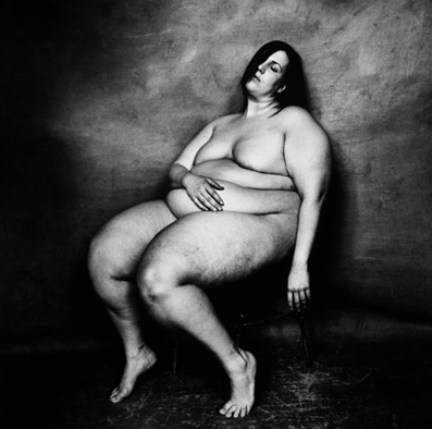Sexing
the Cherry (1989) by Jeanette Winterson is a story about a mother,
Dog-Woman, and her adopted son, Jordan, who travel through time and space.
There are historical events, finding exotic fruit, and the intertextuality of
the fairy-tale ‘Twelve Dancing Princesses’. Ultimately, it is about The Self,
and the journey to finding it. Sexing the
Cherry is narrated by Dog-Woman; she is the agent of her own story, like
the young girl’s narration in The Bloody
Chamber (1979) by Angela Carter.
Dog-Woman describes herself as having a flat nose, “heavy
eyebrows” (2001:24), a few rotten teeth and that her face has “caves” from
where she had smallpox as a child, she calls them a home for fleas (24). She
also has “fine blue eyes that see in the dark” (24) and she “stand[s] taller
than any[one]” (25), she is also so heavy that she managed to send an elephant
into the air and when she was young she broke both her father’s legs when she
sat on them. Dog-Woman has the definition of a grotesque body; she is
exaggerated and has the female body of excess, making her a big monstrous
woman.
 |
| Irving Penn, Large Nude Woman Seated ("Epic Proportions") |
According to Sonia Front, Dog-Woman’s “grotesque body recalls those of
the Rabelaisian giants. Her extraordinary size and ugliness […] engender fear,
terror and aggression” (2009:27). Rabelais’s ‘Gargantua’ was used as a “vehicle
for cartoon violence and toilet humor” (Best, 2009), which Winterson took up
and used as a “way to poke fun at a few shreds of taboos that cling to the
female body” (Best, 2009); the cross between the chaos and humor is a good
example of the carnivalesque. Winterson’s Dog-Woman also allows “the grotesque
body [to] overlap the world, […][and] its borders become blended with the
animal and the inanimate” (2011:98), in Sexing
the Cherry, Dog-Woman is told by a religious man to gouge out her enemies
eyes and teeth, which is a horrific and somewhat animalistic notion. She ends
up telling us, the readers, the amount she has gained, 119 eyeballs and 2000
teeth (2001:85). The quote also draws upon the sheer size of Dog-Woman, having
a body that would ‘overlap’, “I was wearing my best dress, the one with a wide
skirt that would serve as a sail” (2001:64).
 |
| Gargantua and Pantagruel |
There is also the matter of her father, he attempts to
steal his daughter and sell her to a circus, much like the carnival freak shows.
She is so grotesque that her father believes he is able to profit from it, I am
not sure whether he did it for just the money or that he just could not stand
having a child like her. Dog-Woman kills her father and forgets it,
I have forgotten my
childhood, not just because of my father but because it was a bleak and
unnecessary time
(2001:107)
It seems that Dog-Woman knows that she has had a hard
time due to her appearance, especially when she is older; she takes it in her
stride and makes the most of it. She becomes a strong feminine character; she
addresses a number of gender and sexuality problems, although they may not have
been looked at closely at the time. For example Sexing the Cherry, Sonia Front says that Winterson’s text is about “regaining
the female body for female desire” (2009:128) and she continues on to say that
the text is addressing lesbianism:
Dog-Woman’s excessive grotesque body […]
stipulates postmodernism’s metaphoric figuration of the lesbian body.
(2009:115)
Sexing
the Cherry may not seem like a lesbian text straight away; however
there are some moments that Dog-Woman could be said to be tackling sexuality/gender
roles, as well as a woman’s role in a man/woman relationship. Dog-Woman gives
her opinion on men,
I don’t hate men.
Just wished they’d try harder. They all want to be heroes and all we want is
for them to stay at home and help out with the housework and the kids.
(2001:127)
 Winterson, through
Dog-Woman, brings forward the ideas of equality in a relationship between man
and woman; she does not make any direct statements towards a sexual
relationship to women, even though critics make links to that effect today. Critics should focus on Dog-Woman as a good example of the female grotesque;
men will be fearful of her, her own husband left her because he could not deal
with her grotesque body. Men feared the woman’s sexuality, Dog-Woman believes
in equality in the relationship, making her a powerful, confidence woman.
Winterson, through
Dog-Woman, brings forward the ideas of equality in a relationship between man
and woman; she does not make any direct statements towards a sexual
relationship to women, even though critics make links to that effect today. Critics should focus on Dog-Woman as a good example of the female grotesque;
men will be fearful of her, her own husband left her because he could not deal
with her grotesque body. Men feared the woman’s sexuality, Dog-Woman believes
in equality in the relationship, making her a powerful, confidence woman.

No comments:
Post a Comment